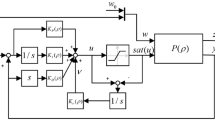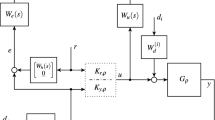Abstract
To bridge the gap between real-world applications and theoretical achievements, this paper proposes a new synthesis approach of gain-scheduled proportional–integral–derivative (PID) control for linear parameter-varying (LPV) systems. It is recognized that the synthesis problem of PID controllers for LPV systems should be formulated as nonconvex optimization problems. To avoid this situation, using a special matrix transformation, novel synthesis conditions with linear matrix inequality constraints are provided in this paper. The stability of the resulting closed-loop system is guaranteed theoretically based on a parameter-dependent Lyapunov function, and two types of robust performance (bounded \(L_2\) norm and induced \(L_2\) norm) are also achieved in the corresponding synthesis conditions. Then, the control system of aircraft is designed based on the proposed method, and the system responses are compared with the traditional LPV-PID control and the LPV dynamic output feedback control.






Similar content being viewed by others
Data availability
Some or all data, models, or code that support the findings of this study are available from the corresponding author upon reasonable request.
References
Hoffmann C, Werner H (2015) A survey of linear parameter-varying control applications validated by experiments or high-fidelity simulations. IEEE Trans Control Syst Technol 23(2):416–433
Shamma JS, Athans M (1990) Analysis of gain scheduled control for nonlinear plants. IEEE Trans Autom Control 35(8):898–907
Becker G, Packard A (1994) Robust performance of linear parametrically varying systems using parametrically-dependent linear feedback. Syst Control Lett 23(3):205–215
Wu F, Yang XH, Packard A, Becker G (1996) Induced \({L_2}\) norm control for LPV systems with bounded parameter variation rates. Int J Robust Nonlinear Control 6(9–10):983–998
Apkarian P, Gahinet P, Becker G (1995) Self-scheduled \({H_\infty }\)control of linear parameter-varying systems: a design example. Automatica 31(9):1251–1261
Packard A (1994) Gain scheduling via linear fractional transformations. Syst Control Lett 22(2):79–92
He X, Zhao J (2014) Multiple lyapunov functions with blending for induced L2-norm control of switched LPV systems and its application to an F-16 aircraft model. Asian J Control 16(1):149–161
Vesel V, Ilka A (2013) Gain-scheduled PID controller design. J Process Control 23(8):1141–1148
Shao P, Jin W, Chengfu W, Ma S (2019) Model and robust gain-scheduled PID control of a bio-inspired morphing UAV based on LPV method. Asian J Control 21(4):1681–1705
Vesely V, Ilka A (2017) Generalized robust gain-scheduled PID controller design for affine LPV systems with polytopic uncertainty. Syst Control Lett 105:6–13
Blondel V, Tsitsiklis JN (1997) NP-hardness of some linear control design problems. SIAM J Control Optim 35(6):2118–2127
Sadabadi MS, Peaucelle D (2016) From static output feedback to structured robust static output feedback: a survey. Ann Rev Control 42:11–26
Mattei M (2001) Robust multivariable PID control for linear parameter varying systems. Automatica 37(12):1997–2003
Gao J, Budman HM (2005) Design of robust gain-scheduled PI controllers for nonlinear processes. J Process Control 15(7):807–817
Kwiatkowski A, Werner H, Blath JP, Ali A, Schultalbers M (2009) Linear parameter varying PID controller design for charge control of a spark-ignited engine. Control Eng Pract 17(11):1307–1317
Zandi Nia A, Nagamune R (2018) Switching gain-scheduled proportional integral derivative electronic throttle control for automotive engines. J Dyn Syst Meas Control 140(7):071015
Nguyen A-T, Chevrel P, Claveau F (2018) Gain-scheduled static output feedback control for saturated LPV systems with bounded parameter variations. Automatica 89:420–424
Lin C, Wang Q-G, Lee TH (2004) An improvement on multivariable PID controller design via iterative LMI approach. Automatica 40(3):519–525
Shu Z, Lam J (2009) An augmented system approach to static output feedback stabilization with \(H_\infty \) performance for continuous time plants. Int J Robust Nonlinear Control 19(7):768–785
Crusius CAR, Trofino A (1999) Sufficient LMI conditions for output feedback control problems. IEEE Trans Autom Control 44(5):1053–1057
Apkarian P, Bompart V, Noll D (2007) Nonsmooth structured control design with application to PID loop shaping of a process. Int J Robust Nonlinear Control 17(14):1320–1342
Huang B, Bei L, Li Q (2019) A proportional-integral-based robust state-feedback control method for linear parameter-varying systems and its application to aircraft. Proc Inst Mech Eng Part G J Aerosp Eng 233(12):4663–4675
De Souza CE, Trofino A (2006) Gain scheduled \(H_2\) controller synthesis for linear parameter varying systems via parameter-dependent Lyapunov functions. Int J Robust Nonlinear Control 16(5):243–257
de Oliveira MC, Skelton RE (2001) Stability tests for constrained linear systems. Springer, Berlin
Nguyen LT, Ogburn ME, Gilbert WP, Kibler KS, Brown PW, Deal PL (1979) Simulator study of stall/post-stall characteristics of a fighter airplane with relaxed longitudinal static stability. NASA Techanical Paper, 1538
Stevens BL, Lewis FL, Johnson EN (2015) Aircraft control and simulation: dynamics, controls design, and autonomous systems. Wiley, New York
Acknowledgements
This research was sponsored by the National Natural Science Foundation of China under Grant #61473186.
Author information
Authors and Affiliations
Contributions
The authors confirm contribution to the paper as follows: BH developed the theoretical formalism, performed the numerical simulation, and drafted the manuscript; BL conceived the original idea, supervised the project, and finalized the manuscript; RN helped verify the theory; QL helped verify the numerical results. All authors reviewed the results and approved the final version of the manuscript.
Corresponding author
Ethics declarations
Conflict of interest
The authors declare that they have no conflict of interest.
Ethical standard statement
This article does not contain any studies with human or animal subjects performed by any of the authors.
Informed consent
For this type of study, informed consent is not required.
Appendix
Appendix
The system parameters at \( h=1000\) ft and \( V=300\) ft/s are given as
The control gains of the induced \( L_2 \) norm LPV-PID control are given as
The control gains of the \( L_2 \) norm LPV-PID control are given as
Rights and permissions
About this article
Cite this article
Huang, B., Lu, B., Nagamune, R. et al. LMI-based linear parameter varying PID control design and its application to an aircraft control system. AS 5, 309–321 (2022). https://doi.org/10.1007/s42401-021-00104-y
Received:
Revised:
Accepted:
Published:
Issue Date:
DOI: https://doi.org/10.1007/s42401-021-00104-y




